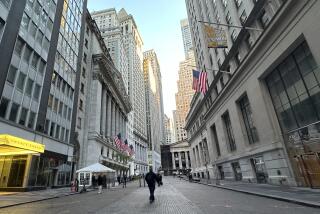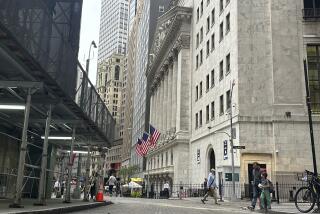Soothing Inflation News Sends Stocks Soaring
NEW YORK — Stock prices surged and bond yields tumbled sharply Tuesday, as government reports showing almost zero inflation and a still-expanding economy sparked a nearly 175-point jump in the the Dow Jones industrial average.
Consumer prices rose only 0.2% last month--despite a sharp increase in energy prices--because of offsetting declines in the cost of apparel, new and used cars and private and public transportation, the Labor Department reported Tuesday.
The so-called core consumer price index, which excludes volatile food and energy prices, edged up 0.1%. Since August 1996, the core CPI is up 2.3%, the smallest rise for a 12-month period in more than 31 years.
Meanwhile, the Federal Reserve reported its index for industrial production, which tracks output of the nation’s factories, mines and utilities, increased 0.7% last month after a 0.4% rise in July.
A third government report, showing business inventories rising 0.2% in July after increasing 0.7% in June, was taken as a sign that the economy isn’t likely to grow as fast in the second half of the year as it did in the first.
The news buoyed Wall Street’s confidence that the Federal Reserve Board will refrain from raising its key lending rate, which could dampen the corporate profits that fuel stocks.
The Dow Jones industrial average--highly volatile this summer--jumped 174.78, or 2.3%, to 7,895.92, as institutional investors poured money back into the brand-name stocks represented by the Dow.
The bond market had its biggest one-day rally in more than three years, with the benchmark 30-year U.S. Treasury bond rising $21.25 per $1,000 of face value. The bond’s yield, which moves in the opposite direction from the price, plunged to 6.40% from 6.57%.
Many stock-market investors had seen 6.50% on the T-bond as a psychological threshold, said Richard Cripps, chief investment officer for Legg Mason in Baltimore. When the yield moved so decisively below that level, it was an all-out buy signal, he said.
The Dow’s big gain was a bit of a reversal: For the last few weeks, smaller stocks had been outperforming the blue-chip issues.
Spooked by the high prices of such popular stocks as Coca-Cola and Gillette, investors had been taking a sharpshooter approach, targeting smaller shares that appeared overlooked and underappreciated.
While the Dow bounced erratically through mid-August and early September, the Russell 2,000 index of small-company stocks cruised smoothly to new highs.
That was good news for holders of mutual funds that lean toward smaller, “growth”-company stocks.
On Tuesday, however, market players put down their rifles and went to the bazooka.
Institutions such as insurance companies and pension funds reacted to the good news on inflation by buying big-name stocks almost indiscriminately. Gainers outnumbered losers on the New York Stock Exchange by more than a 3-to-1 ratio.
A painful exception was Eastman Kodak, which said its third-quarter earnings could slump to half of last year’s level because of troubles in its digital-imaging business and intense price competition with rival Fuji Photo Film Co.
Kodak stock plunged $2.88 a share on the New York Stock Exchange to $57.13--its lowest level in nearly two years.
Other well-known stocks have been pounded recently because of expected earnings disappointments.
If not for Kodak, the Dow would have easily crossed the 7,900 mark. The market barometer remains 4.4% below its Aug. 6 record level of 8,259.31.
A broader big-stock measure, the Standard & Poor’s 500 index, leaped 25.87, or 2.8%, to 945.64, about 1.5% below its Aug. 6 high.
Two other key market indicators hit new highs Tuesday, although their daily gains were not as sharp as the Dow’s or S&P; 500’s. The Nasdaq composite index gained 33.68, or 2.1%, to 1,668.60. The small-stock Russell 2,000 index was up 5.01, or 1.1%, to 445.18.
“This is about as good as it gets,” said Jim Collins, chairman of Insight Capital Research & Management in Walnut Creek, Calif., which manages a $1.2-billion portfolio favoring smaller stocks.
When a pension fund has a terrific year in the stock market, its managers tend to get conservative and start looking at Treasury securities, Collins said.
“But now they say, ‘Hey, with a 6% yield, who wants bonds?’ ” he said.
With the Dow up more than 22% so far this year, investors will put up with a lot of volatility before they bail out of stocks.
And this has been a volatile year. The Dow has seen more daily price swings of 1% or more this year than in any since 1987.
The 10th anniversary of the Dow’s historic 508-point plunge is coming Oct. 19, and as the date approaches there will inevitably be comparisons between this year’s market surge and the one that led up to the 1987 crash.
Although Legg Mason’s Cripps said he expects stocks to continue moving in a “trading range” between 7,600 and 8,000 on the Dow, investor complacency is a danger.
Twice this summer, the Dow has drifted into the mid-7,600 area before bouncing sharply higher when bargain hunters came back into the market.
If investors get lulled into thinking that 7,600 is a floor below which stocks cannot descend, Cripps warned, they may be riding for a fall.
Among Tuesday’s highlights:
* The sudden improvement in the interest rate outlook boosted financial-services stocks. American Express rose $3.88 to $80.75, Travelers Group rose $3.88 to $70.19, Citicorp rose $3.94 to $131.44, and Chase Manhattan rose $3.06 to $115.56.
* Microsoft rose $5.69 to $136.38. The stock had slid more than $7 on Monday after the software maker announced plans to delay an update to its Windows operating system.
Overseas, Tokyo’s Nikkei stock average edged higher, Frankfurt’s DAX index rallied 2.1% and London’s FTSE-100 jumped 1.5%.
The dollar rose against the mark after two Bundesbank officials suggested that German interest rates will not rise soon. The dollar also rose against the yen amid further signs of a faltering Japanese economy.
The dollar reached an intraday high of 1.7760 marks after the Bundesbank talk but it eroded to 1.7695 late Tuesday from 1.7605 Monday. It rose to 121.22 yen from 120.20 yen Monday.
(BEGIN TEXT OF INFOBOX / INFOGRAPHIC)
Tumbling Yields
Mild inflation news on Tuesday sent market interest rates down sharply, with the yield on the 10-year Treasury note--a benchmark for mortgage rates and other long-term rates--falling to 6.11%, the lowest since late July. Weekly closes and latest:
Tuesday: 6.11%
Source: Bloomberg News
*
Market Roundup, D10
*
Times wire services were used in compiling this report.
More to Read
Inside the business of entertainment
The Wide Shot brings you news, analysis and insights on everything from streaming wars to production — and what it all means for the future.
You may occasionally receive promotional content from the Los Angeles Times.










